What is the Forced Swim Test?
The Forced Swim Test (FST) is a behavioral experiment conducted on animals worldwide, including Australia. The test involves placing a mouse or rat in a beaker of water and forcing them to swim, offering them no escape route.
The animals initially struggle, trying to climb out or swim away, but eventually, they stop and start floating. The test is used to study learned helplessness, a behavior similar to depression, and to assess the effectiveness of anti-depressant drugs. However, the ethics of using this test on animals are highly debated.
Originally designed in the 1970s, this unscientific model is still used by some Australian universities today, including the University of Melbourne (Florey Institute of Neuroscience and Mental Health), Monash University, University of Western Australia and the University of Queensland. Examples of experiments are below.
Read more in this special edition bulletin on the FST.
Watch our campaign video.
Share this to Twitter
@AnimalFreeSci and @PETA call to end the #ForcedSwimTest on rats and mice in #Australian #research it is cruel, unnecessary and results are not human-relevant. Sign #petition #EndAnimalTesting #CrueltyFree #AnimalExperiments #AnimalExperimentation #AnimalTesting https://animalfreescienceadvocacy.org.au/forced-swim-test-at-australian-universities/
The Forced Swim Test is a cruel #animalexperiment. Rodents are forced to swim in water until they give up. This is cruel, unnecessary and results are NOT human-relevant. Sign the @PETA @AnimalFreeSci‘s #petition to #EndAnimalTesting of this kind in #Australia https://animalfreescienceadvocacy.org.au/forced-swim-test-at-australian-universities
Validity of the test
The strength of the validity of the FST is now widely disputed. Instead of giving a true indication of mood or depression, the FST, in effect, really only records the time the animal takes to give up its struggle to swim to survive. Increasingly scientists themselves are divided about the correct interpretation of the results. Some claim that animals who spend more time floating are depressed, but experts reason that floating is more likely to be an indication that animals are learning, conserving energy, and adapting to a new environment.
Whilst depression is a chronic, relapsing disorder, the mood of of animal could change when the test in complete, and does not represent the human condition. Immobility in animals may be prevented by a drug within 24 hours, whereas there is a therapeutic lag in humans, further evidence of the futility of the test.
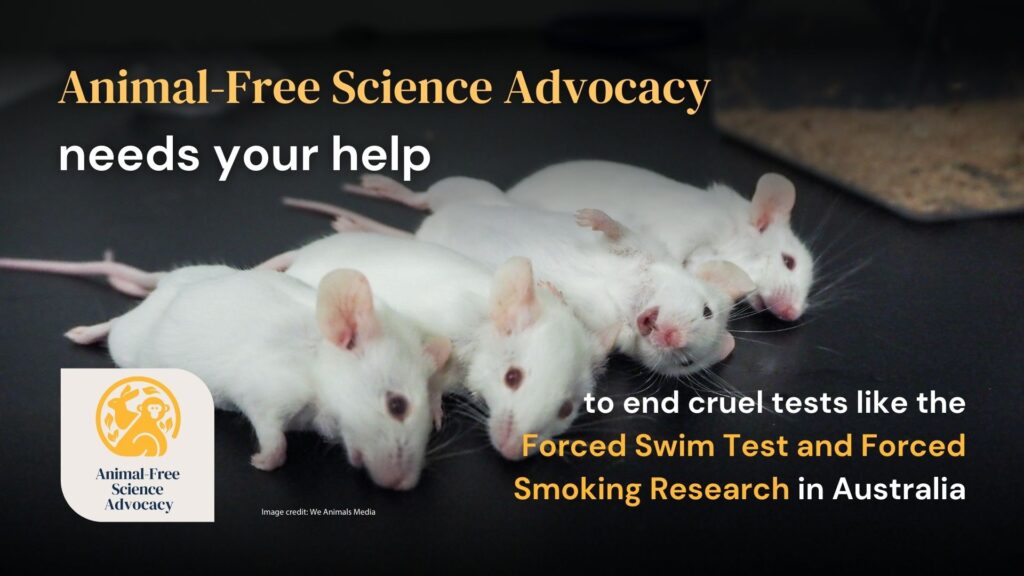
Australia’s involvement in the cruel Forced Swim Test
A brief summary of some of the experiments in which mice have been required to undergo the forced Swim Test is set out below. Many of these experiments were funded by Australian taxpayers by way of grants from the National Health and Medical Research Council, Australia’s prominent funding body for medical research.
Note that the National Health and Medical Research Council will no longer fund projects using the forced swim test as a model for human depression or anxiety. Read our media release in response here.
The FST will no longer be permitted for new projects in NSW. Read our media release in response here.
The Florey Institute of Neuroscience and Mental Health, (University of Melbourne)
For many years the Florey Institute has used mice and rats in various depression experiments. In one study researchers, noting that sex differences in humans are a prominent feature of the pathophysiology of psychiatric disorders, devised a study aimed at investigating the effects of ovariectomy and chronic 17β -estradiol treatment via a subcutaneous silastic implant on behaviours relevant to depression in adult female rats (2). Rats were observed attempting to keep swimming in the tube and were assessed for their behaviour.
In other experiments at the Florey Institute (3) environmental enrichment was reduced with the results of the experiment indicating that innate anxiety had no effect on depression like behavior in mice lacking serotonin transporter. Further, to study how paternal stress might influence anxiety and depressive phenotypes in offspring 4 mice were treated with oral corticosterone and their offspring were observed to be showing increased immobility time on the Forced Swim Test.
In a 2023 publication (4), the Florey Institute describes how rats were used to repurpose a drug for the treatment of bipolar depression and again in 2023 the Florey Institute refers to experiments where anxiety related behaviour was assessed using the forced swim test and other measures. (5)
University of Western Australia
To study the mechanism of repetitive Transcranial Magnetic Stimulation for treatment of depression(1), researchers examined the behavioural changes in mice that had been fitted with an olfactory bulbectomy attached to the head. Behavioural effects were assessed in experiments including the Forced Swim Test. Other publications detailed use of a chronic restraint stress (CRS), the elevated maze test and the forced swim test protocol.
Monash University
At Monash University researchers have been observing the impact of cannabinoid receptor 2 (CB2) stimulation on food intake, body weight and mood in mice that had been injected with CB2 and forced to become obese by way of diet and then subjected to the Forced Swim Test (8).
Latrobe University
Latrobe University has used rats to study anxiety-related behaviour in response to prolonged exercise, including the forced to swim test (9).
Queensland Brain Institute (University of Queensland)
Although epidemiological studies indicate that advanced paternal age is associated with increased risk of health outcomes in offspring, including autism and schizophrenia, researchers have attempted to replicate the human studies by using young and old mice and their offspring (6). The young mice faced a battery of behavioural tests including the Forced Swim Test. In another experiment at the Queensland Brain Institute, researchers used mice to study behavioural effects of Vitamin D deficiency, again employing the Forced Swim Test (7).
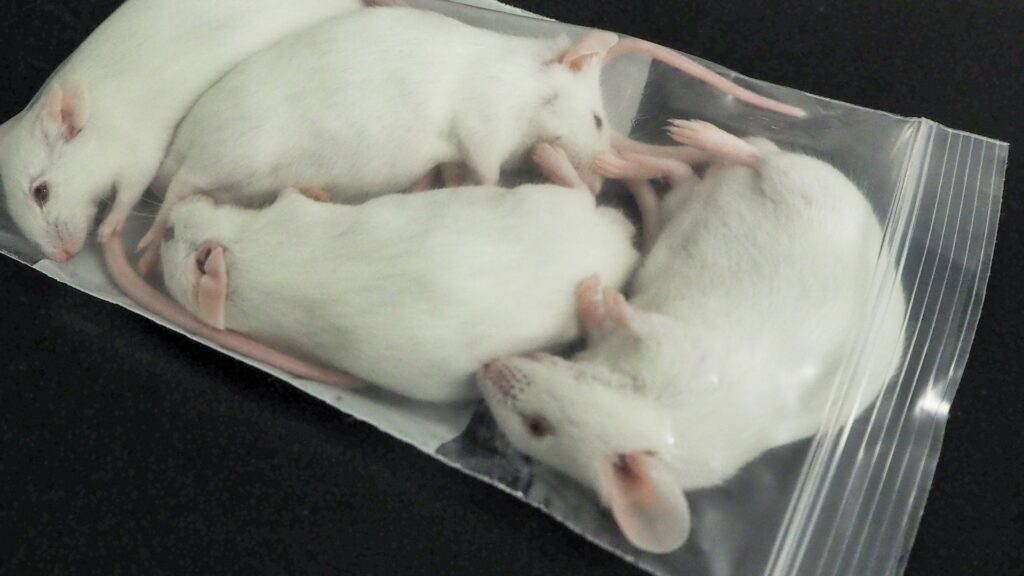
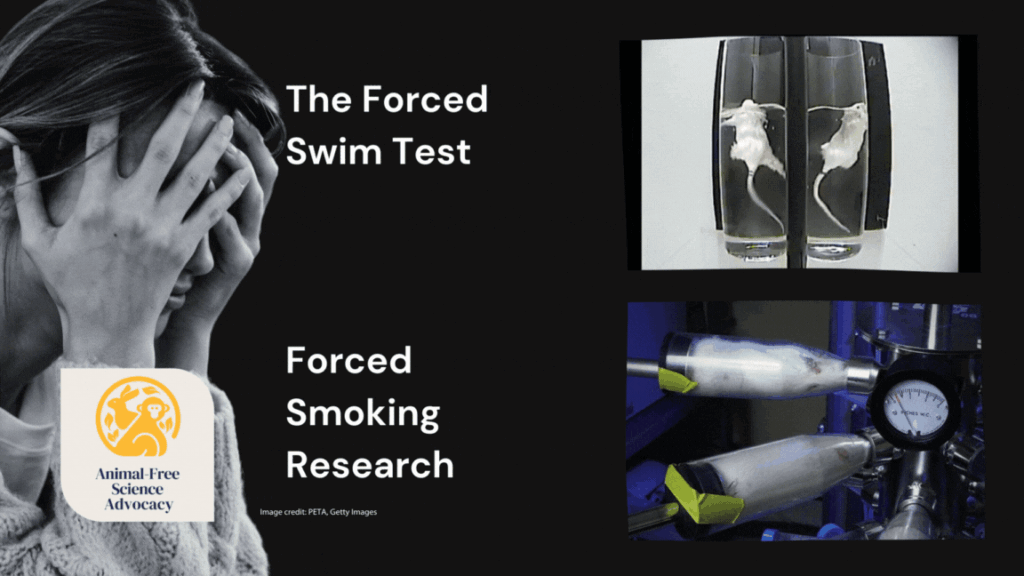
Thank you to these universities for eliminating the Forced Swim Test
The great news is that at four Australian universities, animal ethics committees have already taken the enlightened step not to approve research using the forced swim test.
In Australia
- The University of Adelaide
- The University of South Australia
- Macquarie University
- Griffith University
The Victor Chang Institute, Sydney
The Victor Chang Institute was using a 90-minute forced swim test in cardiovascular research. As of June 2023 the institute have adopted a formal policy prohibiting rodent swimming tests.
In the UK
- Kings College London
- Newcastle University
- The University of Manchester
- The University of Nottingham
- The University of Leeds
- The University of Southampton
- The University of Warwick
- The University of York
- The University of Liverpool
- The University of Brighton
- The University of St. Andrews
Colombia
In 2023, The Universidad del Valle in Columbia became the first university in South America to ban the Forced Swim Test. They have confirmed that they neither use the near-drowning test nor intend to do so in the future.
There are now better ways of doing research
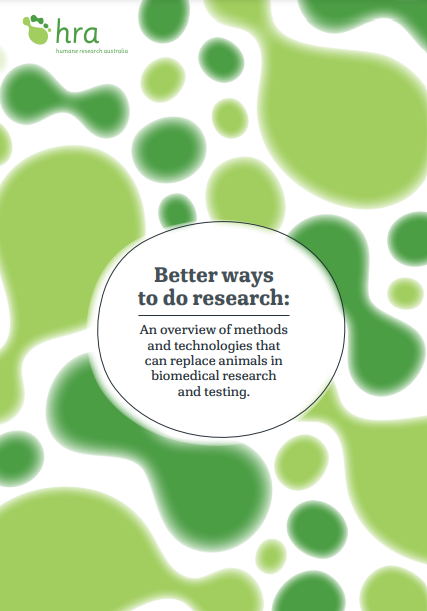
Discover the landscape of innovative alternatives to animal research, written in plain English to bridge the gap between complex science and public understanding. Drawing from authoritative sources such as peer-reviewed journals and government reports, this work distills scientific literature into digestible information. Quotes are used liberally, as who better to explain the research than the researchers themselves?
Focusing mainly on animal research for human benefits, often a contentious point, this overview also acknowledges animal use in veterinary studies.
Existing methods and technologies are perpetually enhanced, with new alternatives surfacing regularly. Despite the complexity of this area, every effort was made to deliver an accessible, informative guide for all. To delve deeper into this transformative shift in research methodologies, we invite you to read the ‘Better Ways To Do Research’ report. It’s time to understand and embrace the science of the future.
What You Can Do
Donate to AFSA

Help Animal-Free Science Advocacy’s important work by making a monthly donation via direct debit or credit card. Your donation will help us to run all of our campaigns and actions. This provides us with secure financial support so that we can continue our work.
Sign this petition
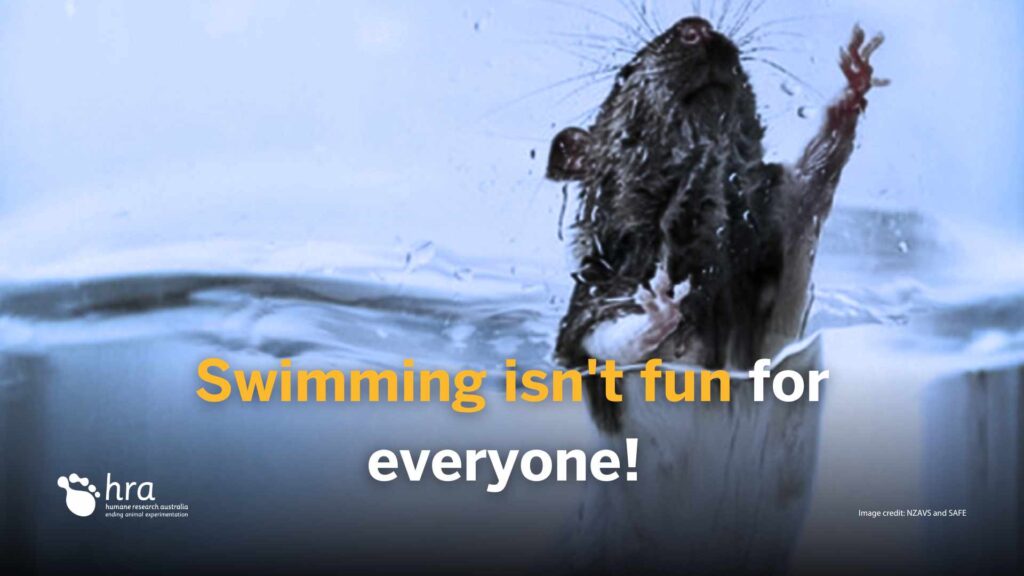
Animal-Free Science Advocacy along with PETA have created an action that calls on Australian universities to stop using the Forced Swim Test here.
Read more

Animal-free research methods offer more accurate, safe, human-relevant and reliable ways to conduct research compared to using animals. Embrace this transformative leap and champion better ways to do research.
Recent research supporting a phase-out of the Forced Swim Test
Emily R. Trunnell, Constança Carvalho,The forced swim test has poor accuracy for identifying novel antidepressants, Drug Discovery Today, Volume 26, Issue 12, 2021
https://doi.org/10.1016/j.drudis.2021.08.003.
Carvalho, C., Herrmann, K., Marques, T. A., & Knight, A. (2021). Time to Abolish the Forced Swim Test in Rats for Depression Research?, Journal of Applied Animal Ethics Research (published online ahead of print 2021). doi: https://doi.org/10.1163/25889567-bja10026
Sewell et al. (2021). Preclinical screening for antidepressant activity – shifting focus away from the Forced Swim Test to the use of translational biomarkers. Regulatory Toxicology and Pharmacology 125: e105002. doi: 10.1016/j.yrtph.2021.105002
Stanford, S. (2017) ‘Confusing preclinical (predictive) drug screens with animal ‘models’ of psychiatric disorders, or ‘disorder-like’ behaviour, is undermining confidence in behavioural neuroscience’, Journal of Psychopharmacology, 31(6), pp. 641–643. doi: 10.1177/0269881116689260.
References
1. Heath A et al. (2018) Medium- and high-intensity rTMS reduces psychomotor agitation with distinct neurobiolgical mechanisms Translational Psychiatry (2018) 8:126 doi: 10.1038/s41398-018-0129-3
Journal of Child and Adolescent Psychopharmacology 2022 32:3, 187-193
Aliphon B, Dai T, Moretti J, Penrose-Menz M, Mulders WHAM, Blache D, Rodger J. A repeated measures cognitive affective bias test in rats: comparison with forced swim test. Psychopharmacology (Berl). 2022 Dec 1. doi: 10.1007/s00213-022-06281-8. Epub ahead of print. PMID: 36450831.
2. Gogos A et al. Differential effects of chronic 17β-estradiol treatment on rat behaviours relevant to depression Journal of Neuroendocrinology (2018) doi: 10.1111/jne.12652
3. Jake Rogers , Shanshan Li , Laurence Lanfumey, Anthony J. Hannana, Thibault Renoira, Environmental enrichment reduces innate anxiety with no effect on depression-like behaviour in mice lacking the serotonin transporter
4. Bortolasci, C. et al Use of a gene expression signature to identify trimetazidine for
repurposing to treat bipolar depression. Bipolar Disorders. 2023;00:1–10. DOI: 10.1111/bdi.13319
5. Thivisol, U. et al. Loss of Tyro3 causes anxiety relevant behavioural change in female mice. Brain Research 2023 doi: 10.1016/j.brainres.2023.148319
6. Foldi C et al. Increasing paternal age alters anxiety-related behaviour in adult mice Genes, Brain & Behavior (2018) doi: 10.1111/gbb.12522
7. Groves NJ, Bradford D, Sullivan RK, Conn KA, Aljelaify RF, McGrath JJ, Burne TH. Behavioural Effects of Adult Vitamin D Deficiency in BALB/c Mice Are not Associated with Proliferation or Survival of Neurons in the Adult Hippocampus.
PLoS One. 2016 Apr 4;11(4):e0152328. doi: 10.1371/journal.pone.0152328. eCollection
8. Verty AN, Stefanidis A, McAinch AJ, Hryciw DH, Oldfield B. Anti-Obesity Effect of the CB2 Receptor Agonist JWH-015 in Diet-Induced Obese Mice. PLoS One. 2015 Nov 20;10(11):e0140592. doi: 10.1371/journal.pone.0140592.
9. Jaehne E, Kent JN, Lam N, Schonfeld L, Spiers JG, Begni V, De Rosa F, Riva M, van den Buuse, M. Chronic running-wheel exercise from adolescence leads to
increased anxiety and depression-like phenotypes in adulthood
in rats: Effects on stress markers and interaction with BDNF
Val66Met genotype 2022 Developmental Psychobiology. 2023;65:e22347. https://doi.org/10.1002/dev.22347
